
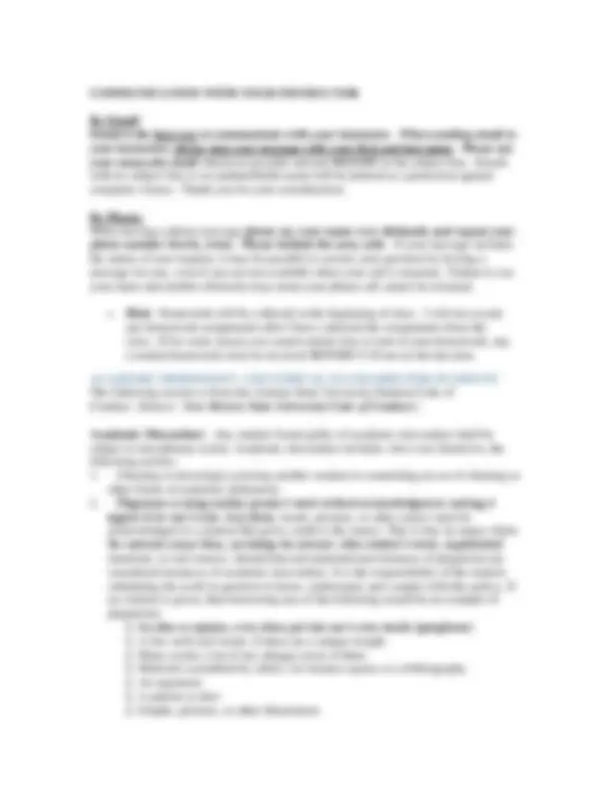
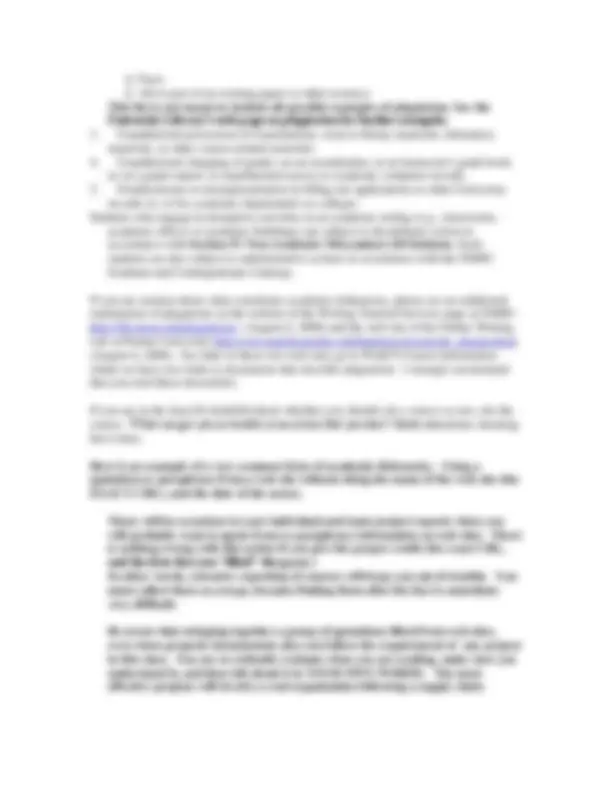

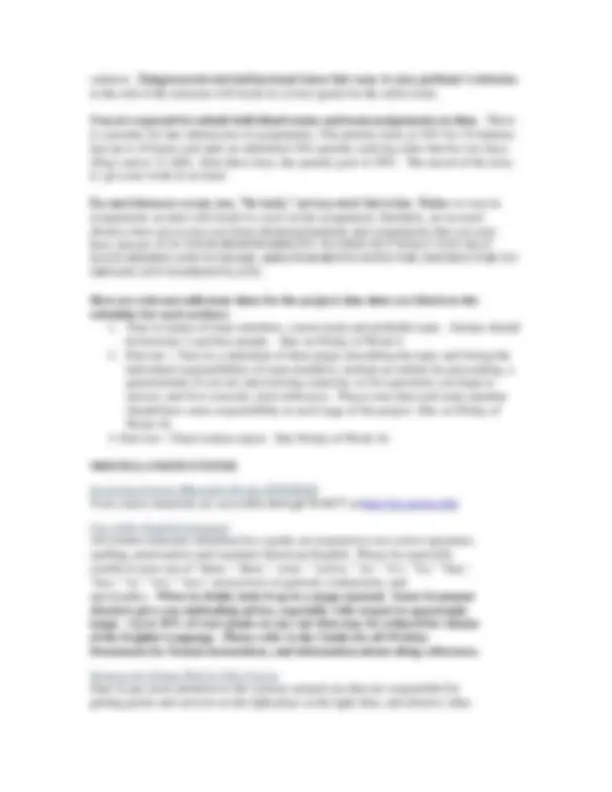
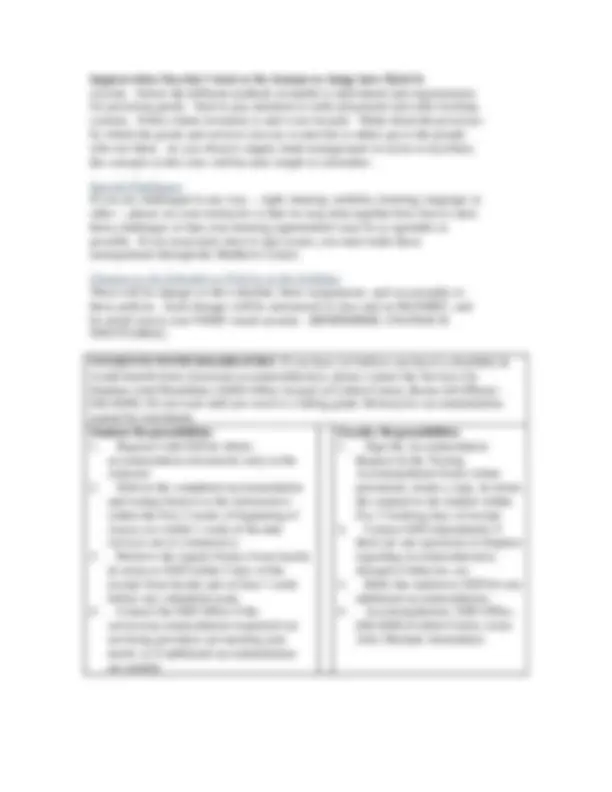
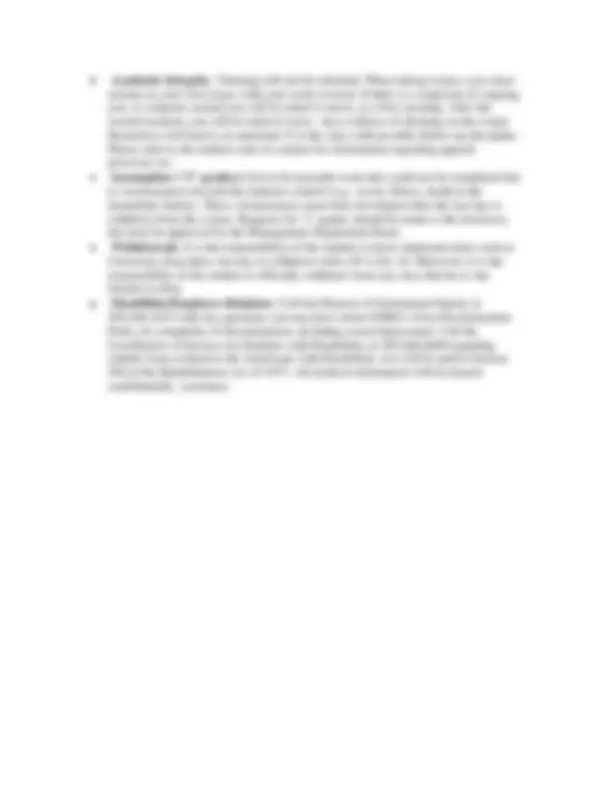


Study with the several resources on Docsity

Earn points by helping other students or get them with a premium plan


Prepare for your exams
Study with the several resources on Docsity

Earn points to download
Earn points by helping other students or get them with a premium plan
Community
Ask the community for help and clear up your study doubts
Discover the best universities in your country according to Docsity users
Free resources
Download our free guides on studying techniques, anxiety management strategies, and thesis advice from Docsity tutors
Material Type: Quiz; Professor: Azadegan; Class: Production and Operations Management; Subject: MANAGEMENT; University: New Mexico State University-Main Campus; Term: Spring 2009;
Typology: Quizzes
1 / 10

This page cannot be seen from the preview
Don't miss anything!







Dr. A. Azadegan
Spring 2009
TEXT
(1) Heizer, J. and Render, B.W., Operations Management 9th ed., Prentice Hall, 2008, ISBN: 0-13-234271-5.
(2) Supplemental online materials.
OFFICE
Office: GU 213 Office Hours: 10:00-11:00 a.m. (Tuesday and Thursday) using Yahoo Chat and by appointment. Telephone: 646- E-mail: azadegan@nmsu.edu
COURSE DESCRIPTION
Operations Management is concerned with the design of productive systems (operating systems) and with the development of management planning and control processes for managing them. A productive system comprises of those elements of an organization that do productive work. They consist of the transformation processes that create goods and service that an organization supplies to its customers.
The basic strategy to be followed in this course is simply that of studying the important problems confronting operations managers, and decision-making processes by which those problems are resolved. In doing so, we will also be attempting to build an integrated view of the problems and of the approaches taken to them. There will also be a great deal of emphasis on the understanding and design of management planning and control systems associated with operating problems.
The field of Operations Management evolved from Production, or Manufacturing Management. The basic concepts and methodologies to be presented were developed primarily for manufacturing operations. Operations Management, however, does not focus entirely on manufacturing problems and methodologies. Many typical problems found in the service industries (i.e., banks, hospitals, hotels, accounting firms, and department stores) are similar to those found in the manufacturing industries (i.e., automobile, machine and tool, and home appliance manufacturers).
Therefore, in this course we will attempt to generalize some of the concepts and methodologies which were originally developed for the manufacturing industries to the service industries.
COURSE OBJECTIVES
The objectives of the course are:
Week No.
Week Ends Topic Key Due Dates Chapter
1 Sun 1/18 Operations and Productivity Quiz by Sunday 1 2 Sun 1/25 Operations Strategy in Global Environment
Quiz by Sunday 2
3 Sun 2/1 Managing Quality Quiz by Sunday 6 4 Sun 2/8 Forecasting Team Member List by Friday Quiz by Sunday
5 Friday 2/13/09Exam 1 Exam by: Friday 2/13/
6 Sun 2/22 Design of Goods and Services Quiz by Sunday 5 7 Sun 3/1/ Design of Goods and Services Quiz by Sunday 5 8 Sun 3/8 Process Strategy Quiz by Sunday 7 9 Sun 3/15 Layout Strategy Quiz by Sunday 9 10 Sun 3/22 Supply Chain Management Part I Team Project by Friday Quiz by Sunday
11 Friday 4/3/09Exam II Exam by: Friday 4/3/
12 Sun 4/12 Inventory Management Quiz by Sunday 12 13 Sun 4/19 Material Requirements Planning (MRP)Quiz by Sunday 14 14 Sun 4/26 Material Requirements Planning (MRP)Quiz by Sunday 14 15 Sun 5/3 Just in Time and Lean OperationsQuiz by Sunday 16 16 Friday 5/8/09Exam III Exam by: Friday 5/8/
§ Facts § All or part of an existing paper or other resource This list is not meant to include all possible examples of plagiarism. See the University Library’s web page on plagiarism for further examples.
If you are unclear about what constitutes academic dishonesty, please see an additional explanation of plagiarism on the website of the Writing Tutorial Services page at NMSU http://lib.nmsu.edu/plagiarism/ (August 6, 2008) and the web site of the Online Writing Lab at Purdue University http://owl.english.purdue.edu/handouts/research/r_plagiar.html (August 6, 2008). For links to these two web sites go to WebCT Course Information where we have two links to documents that describe plagiarism. I strongly recommend that you read these documents.
If you are in the least bit doubtful about whether you should cite a source or not, cite the source. What can get you in trouble is an action that you don’t think constitutes cheating, but it does.
Here is an example of a very common form of academic dishonesty: Using a quotation or paraphrase from a web site without citing the name of the web site (the EXACT URL), and the date of the access.
There will be occasions in your individual and team project reports when you will probably want to quote from or paraphrase information on web sites. There is nothing wrong with this action if you give the proper credit (the exact URL, and the date that you “lifted” the quote.) In other words, extensive reporting of sources will keep you out of trouble. You must collect these as you go, because finding them after the fact is sometimes very difficult.
Be aware that stringing together a group of quotations lifted from web sites, even when properly documented, does not follow the requirement of any project in this class. You are to critically evaluate what you are reading, make sure you understand it, and then tell about it in YOUR OWN WORDS. The most effective projects will involve a real organization following a supply chain
practice, so that information comes from the organization, from people, and from other sources including magazines, newspapers, and web sites.
To receive any of these grades, you need a minimum of: Grade A: 90.00% +; Grade B: 80.00% +; Grade C: 70.00% +; Grade D: 60.00% +; Grade F: below 60.00% Note: Please activate your NMSU email account (address) at https://accounts.nmsu.edu/
Team Project
You will do a project with a team of 3 to 4 people. This team membership may be different than the team with whom you work on in-class assignments, or it may be the same. This team project will involve a study of some portion of the operations management process in an actual organization, or a research paper on a topic of interest to operations managers. The project is described on a separate assignment sheet, which includes guidelines for length and specific requirements. Format guidelines are given in the document posted under course information on MyNMSU. Failure to use these guidelines will result in a lower grade. The report is to be about 15 to 20 double-spaced, typewritten pages (plus exhibits).
Expectations for your behavior with regard to team assignments:
For team assignments all work turned in is expected to be the original work of the team. Any and all material sources will be cited appropriately or loss of credit will result. Please see the document on the WebCT MGT344 web site under Course information titled Report Guidelines. Also see the excerpt from the NMSU Student Code of Conduct below. All team members are expected to do her or his share of the work. A team is responsible for structuring team work assignments so that every person has some role in each phase of the project. Consider that a project generally has the Idea generation phase, a research collection phase, an organization of the research and draft writing phase, and a finalization phase. Each team is expected to be able to tell me what he or she has contributed in each phase, and be able to produce some evidence to support that contribution (notes, or a draft document.). Furthermore, there should be some general agreement among team members that about what each person’s contribution is.
If a team is having difficulty working together , please tell your professor as soon as you have discovered there is a problem. Signs of difficulty include (but are not limited to) the following: one team member not attending meetings one team member having to do all the work one team member never being available or in class never being able to reach one or more team members a team member does not complete something for which he or she has accepted responsibility one team member never accepts responsibility for any part of the assignment. If you experience any of these symptoms, please discuss it as soon as possible with your professor who will try to help you and your team with an equitable
solution. Disagreements and dysfunctional teams that come to your professor’s attention at the end of the semester will result in a lower grade for the entire team.
You are expected to submit individual exams and team assignments on time. There is a penalty for late submission of assignments. The penalty starts at 10% for 10 minutes late up to 24 hours and adds an additional 10% penalty each day after that for two days. (Days end at 12 AM). After three days, the penalty goes to 50%. The moral of the story is: get your work in on time!
Excused absences excuse you, “the body,” not any work that is due. Failure to turn in assignments on time will result in a zero on the assignment. Similarly, an excused absence does not excuse you from obtaining handouts and assignments that you may have missed. IT IS YOUR RESPONSIBILITY TO FIND OUT WHAT YOU MAY HAVE MISSED AND TO MAKE ARRANGEMENTS WITH THE INSTRUCTOR TO OBTAIN ANY HANDOUTS, ETC.
Here are relevant milestone dates for the project (due dates are listed on the schedules for each section):
MISCELLANEOUS ITEMS
Accessing Course Materials On the INTERNET Your course materials are accessible through WebCT at http://my.nmsu.edu/
Use of the English Language All written materials submitted for a grade are expected to use correct grammar, spelling, punctuation amd standard American English. Please be especially careful in your use of "there," "their," "your," "you're," "its," "it's," "by," "buy," "bye," "to," "too," "two," possessives in general, contractions, and apostrophes. When in doubt, look it up in a usage manual. Some Grammar checkers give you misleading advice, especially with respect to apostrophe usage. Up to 10% of your grade on any one item may be reduced for misuse of the English Language. Please refer to the Guide for all Written Documents for format instructions, and information about citing references.
Strategy for Doing Well in This Course Start to pay more attention to the systems around you that are responsible for getting goods and services in the right place at the right time, and observe what
Academic Integrity : Cheating will not be tolerated. When taking exams, eyes must remain on your own exam, with your work covered. If there is a suspicion of copying, you, or someone around you will be asked to move, as a first warning. After the second incident, you will be asked to leave. Any evidence of cheating on the exams themselves will lead to an automatic F in the class with possible follow-up discipline. Please refer to the student code of conduct for information regarding appeals processes etc. Incompletes ("I" grades): Given for passable work that could not be completed due to circumstances beyond the student's control (e.g., severe illness, death in the immediate family). These circumstances must have developed after the last day to withdraw from the course. Requests for "I" grades should be made to the instructor, but must be approved by the Management Department Head. Withdrawals : It is the responsibility of the student to know important dates such as University drop dates; last day to withdraw with a W is Oct 16. Moreover, it is the responsibility of the student to officially withdraw from any class that he or she intends to drop. Disabilities/Employee Relations : Call the Director of Institutional Equity at 505.646.3635 with any questions you may have about NMSU's Non-Discrimination Policy & complaints of discrimination, including sexual harassment. Call the Coordinator of Services for Students with Disabilities at 505.646.6840 regarding student issues related to the Americans with Disabilities Act (ADA) and/or Section 504 of the Rehabilitation Act of 1973. All medical information will be treated confidentially. assistance